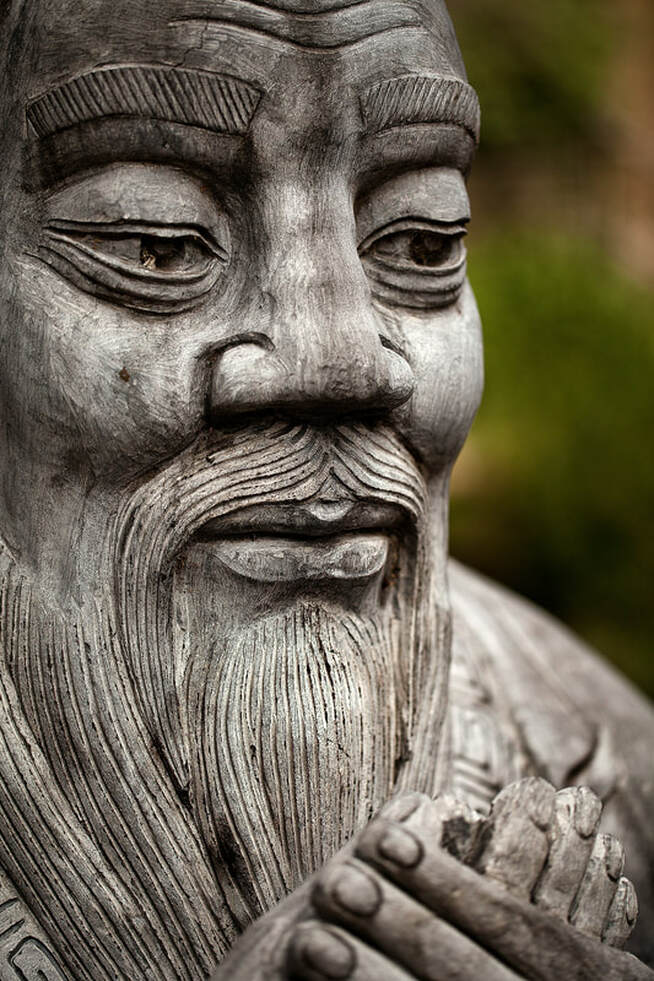The Cosmic Significance
of Being Polite in Daily Life
A Note on Process and Confucianism
A Confucian-influenced process philosophy sees being polite in daily life as one way of being attuned to the harmony of the universe. From a Confucian as from a process perspective, values such as harmony, beauty, truth, and goodness are part of the very nature of the cosmos. We live in a moral universe. Not that people are necessarily moral; often they - we - are not. But we live in a universe that is not value-free. It includes ideals which, if we respond to them, can help us become more compassionate and more fully human.
Being polite in daily life is one way of bringing these ideas down to earth and into daily relations. It embodies the kind of healthy relationality that both Confucianism and process philosophy find so important. True, the Chinese tradition does not speak of a monotheistic God who created the world. But it does speak of Tian or Heaven, which is, among other things, a universal Harmony of Harmonies encompassing the universe.
Interestingly, Harmony of Harmonies is the name Whitehead uses for God in "Adventures of Ideas." It is what he calls "the consequent nature of God" in "Process and Reality." This Harmony is not outside the universe; it is the living unity of the universe, filled with beauty. And it is part of what we feel, intuitively, when we are inwardly lured by ideals such as truth, goodness, and beauty.
The Harmony comes down to earth, not in shouting at one another and not in bullets, but small and kindly ways: in saying "please" and "thank you," in holding the door for others, in offering sincere compliments, in active listening, in waiting our place in line, and other daily and kindly rituals.
These rituals are the social glue of a healthy society and life. They also include the virtue of being humble and modest: not seeing yourself as the center of the universe but in promoting the good of a larger whole. In this willingness to be part of something more, the rituals of daily life are a way that we can be "together" with others in loving ways.
Whitehead speaks of the quiet power of love in the world. Being polite is a form of quiet love. It is part of the heart of Confucianism as relevant to our time: for people in China and other parts of East Asia, to be sure, and to people all over the world. What the world needs now is love sweet love, goes the song. It also needs, as one form of love, politeness sweet politeness.
- Jay McDaniel
Being polite in daily life is one way of bringing these ideas down to earth and into daily relations. It embodies the kind of healthy relationality that both Confucianism and process philosophy find so important. True, the Chinese tradition does not speak of a monotheistic God who created the world. But it does speak of Tian or Heaven, which is, among other things, a universal Harmony of Harmonies encompassing the universe.
Interestingly, Harmony of Harmonies is the name Whitehead uses for God in "Adventures of Ideas." It is what he calls "the consequent nature of God" in "Process and Reality." This Harmony is not outside the universe; it is the living unity of the universe, filled with beauty. And it is part of what we feel, intuitively, when we are inwardly lured by ideals such as truth, goodness, and beauty.
The Harmony comes down to earth, not in shouting at one another and not in bullets, but small and kindly ways: in saying "please" and "thank you," in holding the door for others, in offering sincere compliments, in active listening, in waiting our place in line, and other daily and kindly rituals.
These rituals are the social glue of a healthy society and life. They also include the virtue of being humble and modest: not seeing yourself as the center of the universe but in promoting the good of a larger whole. In this willingness to be part of something more, the rituals of daily life are a way that we can be "together" with others in loving ways.
Whitehead speaks of the quiet power of love in the world. Being polite is a form of quiet love. It is part of the heart of Confucianism as relevant to our time: for people in China and other parts of East Asia, to be sure, and to people all over the world. What the world needs now is love sweet love, goes the song. It also needs, as one form of love, politeness sweet politeness.
- Jay McDaniel

